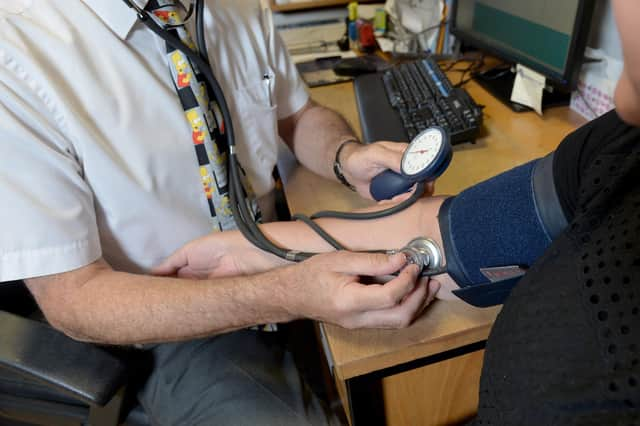Health boss hits out at surge in abuse towards NHS staff in Birmingham and Solihull


A local health boss has described the level of abuse aimed towards NHS staff in Birmingham and Solihull as ‘unacceptable’ and urged people to be tolerant this winter.
Dr Richard Mendelsohn, Chief Medical Officer at NHS Birmingham and Solihull CCG, said there has been a ‘huge increase’ in the amount of abuse directed at staff in the region.
Advertisement
Hide AdAdvertisement
Hide AdHe has blamed this on an increase in demand for services, with local CCG figures showing call volumes to GP surgeries increasing by 100%.
Dr Mendelsohn’s comments come as NHS Providers - the membership organisation for NHS trusts in England - said trust leaders believe this will be the “most difficult winter in the history of the health service”.
Dr Mendelsohn said: “The demand we’re seeing across the whole of the NHS is a huge challenge which we are trying desperately hard to meet.
“But with this increase in pressure, we are also seeing a huge increase in the level of abuse being directed towards NHS staff which is simply unacceptable. I would urge everyone to continue to demonstrate patience as we work harder than ever to care for you, and would also encourage patients to consider whether they are choosing the very best service for their condition.”
Why is there a higher demand for NHS services?
Advertisement
Hide AdAdvertisement
Hide AdCall volumes to practices in Birmingham and Solihull are up by 100% from June to August 2020 to 2021, according to CCG figures.
In 2020 the average calls per month were 1.07 million, rising to 2.14 million in 2021.
The demand for services is affected by the different ways patients have been asked to access services since Covid.
The majority of practices in Birmingham and Solihull, and around the country, now operate a ‘triage first’ model which requires patients to undergo a phone or virtual consultation in place of or ahead of a face-to-face appointment.
Advertisement
Hide AdAdvertisement
Hide AdWith pressure building, some patients fear their chances of getting a face-to-face appointment may diminish and they may have to be waiting longer than usual to get through to their GP surgery on the phone.
The CCG said this is having an ‘enormous impact’ on the workload of GPs and leaving some patients ‘feeling frustrated’.
The issue of whether GPs are offering enough face-to-face appointments as Covid-19 restrictions eased in the last few months remains hotly debated.
Health Secretary Sajid Javid unveiled a £250m package for GPs in England in October to improve access to their services - but only if they increase the number of in-person consultations.
Advertisement
Hide AdAdvertisement
Hide AdFollowing the national announcement of extra funding, the Birmingham and Solihull CCG said that work will be undertaken to review its telephone systems in the coming weeks.


What are local GPs saying about face-to-face appointment availability?
Dr Will Taylor, Clinical Chair at NHS Birmingham and Solihull Clinical Commissioning Group (CCG) and a local GP, said: “General practice teams, including my own, have been working tirelessly over the last few months, often at great personal sacrifice, to provide not only the same level of care our patients are used to, but to do so in a Covid safe way.
“The last thing we want to do is invite a very vulnerable elderly person in to the practice at the same time as someone who has a serious fever or other potentially contagious illness.
“We understand that some patients are frustrated that they might not be offered a face-to-face appointment or that they may be waiting longer than usual to get through on the phone, but we can assure the public that we are doing everything we can to cope with the current demand and we are constantly evaluating how we provide care to ensure no one misses out.”
NHS ‘beyond full stretch’
Advertisement
Hide AdAdvertisement
Hide AdNHS Providers says that its regular annual survey of trust leaders shows a much higher level of concern about the coming winter than ever before, and has called for immediate, emergency action to support social care.
A statement from NHS Providers read: “Trust leaders are deeply concerned about the combined impact of increased demand for emergency care, growing waiting lists, significant and sustained staff shortages, potential staff burnout, the extra resource needed for vital vaccination campaigns and the prospect of high levels of Covid-19, flu and other respiratory viruses.”
The report points to the unprecedented scale of current pressure in the ambulance sector – with all ambulance services on the highest level of alert – as a clear indication of the NHS currently being “beyond full stretch”.
The similarly unprecedented high levels of bed occupancy in many hospitals for this time of year are, equally, a worrying indicator.
Advertisement
Hide AdAdvertisement
Hide AdChris Hopson, chief executive of NHS Providers, said:“The message from trust leaders is loud and clear: judging by the pressure the NHS is currently under, the service is heading for the most difficult winter in its history.“The current COVID-19 caseload is considerably lower than the peak at the start of the year, but when we consistently run our health and care system at the limit of its capacity, it doesn’t take much extra pressure to increase risk to patient safety and quality of care.
A message from the editor:
Thank you for reading. BirminghamWorld is Birmingham’s latest news website, championing everything that is great about our city - reporting on news, lifestyle and sport. We want to start a community among our readers, so please follow us on Facebook,Twitter and Instagram, and keep the conversation going.
Comment Guidelines
National World encourages reader discussion on our stories. User feedback, insights and back-and-forth exchanges add a rich layer of context to reporting. Please review our Community Guidelines before commenting.
